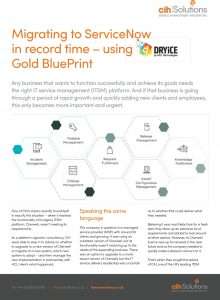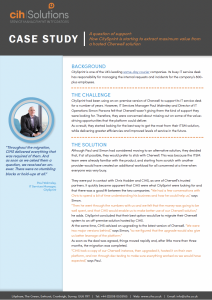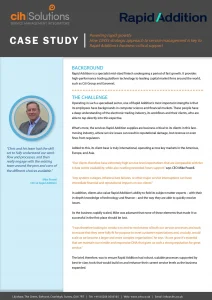Background
The South West London Integrated Care Board (SWL ICB) is an NHS trust covering five London boroughs. Its IT team supports internal users and supplies centralised services to 180 GP practices across the region. It also manages smart card services (which allow limited access to patient medical records) for 185 pharmacies.
The Challenge
In March 2022, due to internal restructuring within the NHS, the SWL ICB was told it would need to transition away from the shared IT service management solution that it had been using.
This left the ICB with a limited amount of time to identify and migrate to another solution, which would need to include the platform, infrastructure and service desk.
The challenge was made harder by the fact that IT services needed to be delivered across a highly complex environment, as the 180 GP practices it supports are effectively run as standalone businesses, as are the pharmacies.
“We just didn’t have the time to go to market and look at what matched our complex requirements as an organisation,” says Neelesh Patel, IT Service Management Transition Lead at the SWL ICB. “So we needed to take something that seemed to be working well elsewhere and then manipulate it in such a way that we could go live with a minimum viable product as soon as possible, then take it forward.”
The team therefore settled on switching to the Cherwell platform already being used by the South West London and St. George’s NHS Mental Health Trust (MHT), which was managed by CIHS.
But this presented a further challenge as it meant the ICB and MHT would be required to share a single platform, which required a clear understanding of what data needed to be separated and what could be kept in common across the two operations.
The solution
In the first instance, the SWL ICB opted for the managed service solution offered by CIHS.
“We did this because Cherwell is a complex tool that none of us know well enough in-house to be able to develop and implement ourselves,” says Neelesh. “So we needed an expert team on hand. CIHS were able to guide us on an on-going basis, based on what our requirements were, while helping us to understand what could realistically be delivered in Cherwell.”
In particular, the ICB team was impressed by how well CIHS’s CEO, Chris Hodder, and the rest of the team, understood the ICB’s needs.
One of the realities of the project was that it was impossible to fully integrate the 180 different networks being run by the GP surgeries. “No tool is that clever,” says Nimesh Patel, Acting Director of Operations for IT at the SWL ICB. So, instead, CIHS had to work with the ICB team to devise a solution that allowed their customers access to Cherwell in the most effective way possible.
“We brainstormed a solution,” says Nimesh. “And we ended up putting something in place that works. And I think what we came up with is better than what was there previously.”
It’s also worth noting, he adds, that running two organisations from a shared platform is virtually unprecedented and so the teams had to develop some innovative approaches to the challenges they faced. “This way of operating was new for them, and new for us. It was a unique thing to do,” he says.
Once the project team had worked out what data could be accessed from each organisation and what could not – and what was unclear, but could be put to one side for the time being, in light of the pressing deadline – it was a question of working through this “to identify the potential gotchas,” says Nimesh.
Throughout the process, the key focus was to keep the customer experience as unique and as positive as possible, while dealing with any back-end issues as they arose, he emphasises.
Furthermore, there was a requirement to move at pace – and, indeed, the solution went live in late 2022, just eight months after the project began.
CIHS’s pragmatic, solutions-focused approach, delivered through its managed service, was a significant factor in the success of the project, particularly when woking at such pace, says Neelesh.
“Chris is great at telling you what is and is not possible within the time constraints and the constraints of the Cherwell system, then finding a solution for what you need to do,” he explains. “He’s well known for saying, ‘This ain’t our first rodeo.’ And he’s right. He and the team really know what they’re doing.”
Troubleshooting problems
“With every tool, you’re going to get a problem at some point, no matter what it is,” says Nimesh. “And this is especially the case for us, since we’re doing a number of things that are unique for both of us, while our requirements are complex and take time to test and implement.
“But CIHS have always been responsive to every issue as it has arisen and I’ve been happy with the way they have dealt with them.”
They were also able to quickly add resources when things needed to move rapidly – another benefit of the managed service solution.
The outcome
“We wanted the customer experience to be a positive one, and the transition to be seamless for them,” says Neelesh. “And I think we succeeded.”
This is borne out by the data. In February 2023, just four months after the transition, usage of the system had risen to 100%. What’s more, the feedback received from customers was 90% positive.
But the ICB team are determined not to rest on their laurels. “With any tool, it’s never a completed thing, it’s always a work in progress,” says Nimesh. “We still have various packages to work through, and want to do more training so we can be more autonomous.”
He adds: “We’re also looking to build out more workflows to support our IT asset management.” To do this, they are planning to use CIHS’s own CMDB Pro product, as well as its automated workflow system which will allow the ICB to automate more of its functions. “The aim is to reduce the amount of manual effort and, as far as we can, the possibility of human error,” he says.
For all of this, CIHS’s ongoing support through its managed service is vital, stresses Neelesh.
Moving forwards, the ICB is keen to offer its IT support services to more organisations in NHS England within its internal marketplace. “Our ITSM tool, supported by CIHS, will be central to achieving that and making sure it’s manageable and viable,” says Neelesh.
Overall, both Nimesh and Neelesh have been delighted with the work that CIHS have done to date, and continue to do on an ongoing basis.
“Working with CIHS has been a very positive experience,” says Nimesh. “We gave them a challenging set of requirements and they’ve had to deliver against some difficult timelines, often with moving targets. But they’ve been flexible, professional and are clearly experts in their field.”
We needed an expert team on hand. CIHS were able to guide us on an on-going basis, based on what our requirements were, while helping us to understand what could realistically be delivered.
Neelesh Patel, IT Service Management Transition Lead, South West London Integrated Care Board
Working with CIHS has been a very positive experience. We gave them a challenging set of requirements and they’ve had to deliver against some difficult timelines, often with moving targets. But they have been flexible, professional and are clearly experts in their field.
Nimesh Patel, Acting Director of Operations for IT, South West London Integrated Care Board



